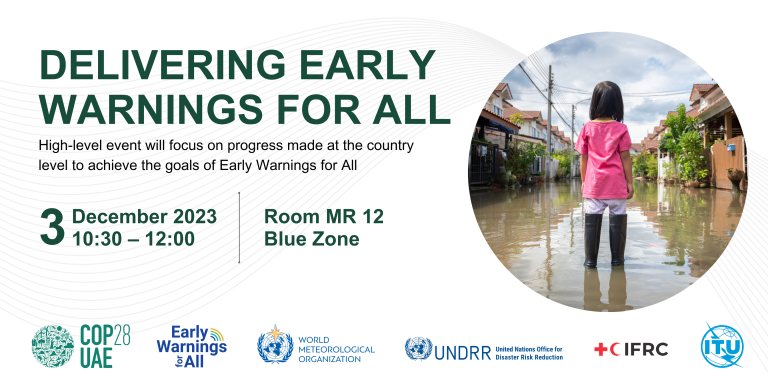Delivering Early Warnings for All


Dubai, الإمارات العربية المتحدة

Launched in 2022 by the UN Secretary-General, the Early Warnings for All initiative calls for every person on Earth to be protected by an early warning system by the end of 2027. The initiative has already gained high-level political support to address the early warning gap and was welcomed by the COP27 Sharm El-Sheikh Implementation Plan, and is featured in the COP28 Presidential Action Agenda. A first set of 30 focus countries, including SIDS, LDCs and LLDCs have been identified and supported fast-track implementation support in 2023. The initiative builds on the extensive work already being done in countries to protect communities from disasters. By bringing these efforts together through intensified coordination and collaboration, Early Warnings for All aims to accelerate and scale up action, while ensuring cost efficiency.
With human-induced climate change leading to more extreme weather conditions, the need for early warning systems is more crucial than ever. Systems that warn people of impending storms, floods or droughts are not a luxury but a cost-effective tool that saves lives, reduces economic losses, and provides a nearly tenfold return on investment. Early warning systems have helped decrease the number of deaths and have reduced losses and damages resulting from hazardous weather, water or climate events.
But major gaps still exist, especially in small island developing states and least developed countries. Between 2010 and 2020, human mortality from floods, droughts, and storms was 15 times higher in highly vulnerable regions. Over the last 50 years, nearly 70% of all deaths from climate related disasters have occurred in the 46 poorest countries. Yet to date, only half of all the countries worldwide report having the capability to alert their citizens about impending weather and climate hazards, and in Africa, six out of every ten persons are not covered by an effective early warning system.
This high-level event will delve into how progress is being made at the country level to achieve the goal of Early Warnings for All, sharing lessons learnt from some of the first set of focus countries to roll out the initiative, to inform others developing their own national roadmaps. It will demonstrate how partnerships and innovation are advancing the full early warning to early action chain, to support countries efforts to adapt to current and future climate risks and highlight the path ahead for how more partners can join efforts to achieve the goal.

